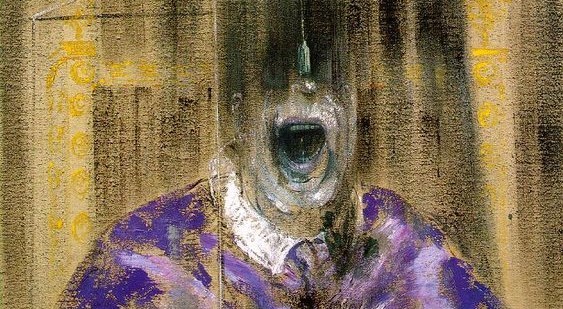
Feeling Darkness: How Francis Bacon Makes us Rethink Art
Francis Bacon is part of the reason why people are confused by Modern Art. It's doesn't at all subscribe to realism as a standard, nor does Bacon consciously try to cater his art to a particular audience. But Francis Bacon's art is nonetheless important, not only because he's one of the most important artist of the last century, but also because he's one of the best examples of how Modern Art can be so powerful.
There're more reasons for looking at fine art other than the fact that you happen to be in a city with a major museum. One of the main reasons we're drawn to art is because we seek understanding and meaning in life. For the longest time, painting helped to understand what happened or the way things look--think wall hieroglyphs, portraits and even landscape paintings, but there's more to art than re-creation. By the time photography came around, artists publicly renounced pure realism as a lost cause, and frankly saw it as less important. Painting, and art in general, came to focus primarily on expression rather than representation--in other words, we paint how people feel, or think, not just how they look.
There are a lot of examples of artists that broke the mold, like Van Gogh's twisted visions, or Dali's psychological reverie, but one of the more modern examples--and the most poignant, is English artist Francis Bacon. He exhibits many of the features of what makes Modern art powerful and visceral. Just like Van Gogh, or Dali we shouldn't necessarily judge him based on how his paintings look, but how they feel.
Saying that Francis Bacon lived a troubled life wouldn't be inaccurate, but it would be wholly inadequate. As a young man, Bacon had an extremetly violent father, and was frequently abused in every way by those close to him. After so much pain, his mind became twisted between extreme feelings of isolation, pain and pleasure. His adult life was spent as an artist, all the while struggling with his sexuality, alcoholism and drug abuse. Even when his art became popular, his life was still riddled with relationships that left him deep scars on the face of his body and soul.
From an artistic perspective, we're able to not only see the pain, but feel it powerfully in the paintings he left us. He uses large, painterly strokes, which gives them stronger texture--as if he's making a bolder statement. The colors are usually dark, with fleshy, or grayish tones surrounding the often twisted, abstract figures. What we can try to understand from the mutilated flesh and twisted figures, mixed with the the ominous motifs is Bacon's feeling of disfigurement, agony and hopelessness in a life tormented by violence and pain.
Now, I'm not advocating that everyone should like Bacon's art--that would in some ways defeat the point. You're not supposed to get a "good" feeling from his art anymore than you should from a torture scene in a movie, or the horrifying descriptions in a victim's account. The skill in Francis Bacon's art is that he's able to get us the same fearful and ominous feelings with less material; for some reason, we don't need to understand Bacon's art in order to feel what he intends--those bad feelings are intentional. For some reason, he's able to paint feelings clearly enough that it doesn't necessarily require explaining, context is enlightening, but it doesn't make the paintings any less extreme--it's still that unspoken, visceral feeling.
Once again, I don't expect anyone to "like" Francis Bacon's painting, but I do think that understanding the theory behind his art helps us to better understand the way that all artists work. Painting, like any art, is about story. There's a universality in Bacon's painting that speaks beyond barriers, and I'm pretty sure they have the ability to scare and confuse anyone. In light of this, we can also realize that art helps us to feel happiness without having to explain it. How we use art is ultimately a choice of the talents that we have, and the story we have to tell. Francis Bacon't paintings help us to feel the horror of a life that no one should have to live, and also to see the genius in someone who was able to express those feelings in a way that speaks just as clearly today as it did half a century ago.


